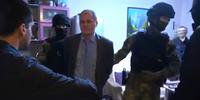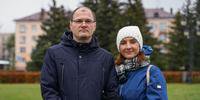The Case of Chagan in Tolyatti
Filter
- #
The house of Alexander and Ekaterina Chagan is being searched.
- #
Ruslan Mgoyan, an investigator of the Central Interdistrict Investigation Department of Tolyatti, Investigative Directorate of the Investigative Committee of the Russian Federation for the Samara Region, is initiating a criminal case under Part 1 of Article 282.2 of the Criminal Code of the Russian Federation. In his opinion, "an unidentified person, acting intentionally, in the period from 2017 to the present ... continued to carry out organizational actions aimed at resuming the illegal activities of the religious association... by convening meetings, recruiting and recruiting new members of the religious association."
- #
Searches are underway at three addresses of believers, including a second search of the Chagan family. It is conducted by the senior detective of the Center for Countering Extremism E. Y. Rodich.
- #
At night after the end of the search, investigator Mgoyan interrogates Aleksandr Chagan in the building of the Investigative Committee. After that, he places the believer in a temporary detention facility.
- #
The Tolyatti District Court refuses to allow investigator Mgoyan to choose a preventive measure in the form of detention. The believer is released in the courthouse, taking from him a written undertaking not to leave.
On the same day, the investigator brings Alexander Chagan as a defendant in the previously initiated criminal case.
- #
The case is submitted to the Central District Court of Tolyatti (Tolyatti, Belorusskaya Street, 16).
- #
The hearings in the case of Aleksandr Chagan have begun. About 25 people come to the meeting room to support the believer.
Judge Victoria Gorbasheva establishes the identity of the defendant, explains to him the rights and obligations. The court hearing is postponed due to the absence of a lawyer.
- #
The prosecutor reads out the charge, the defendant announces his attitude to the charge and declares the refusal of a lawyer. The court dismissed the application.
- #
The questioning of witnesses begins. One of them is detective I. V. Matytsin. Answering most of the questions, he says that this is not in his competence, since he is neither a technical specialist nor a religious scholar, and "is not obliged to disclose the ORM." Also, the witness cannot specifically indicate what signs of a threat to the security of the state he saw in the actions of the defendant.
At the request of the prosecutor, the protocol of Matytsin's interrogation is announced.
- #
Interrogation of a prosecution witness whose mother is one of Jehovah's Witnesses. She says she has a "strongly negative" attitude toward the denomination, calling them "active preachers and the only organization that offers Bible studies."
To the questions of the defense about whether she heard from Chagan calls not to serve in the army, not to celebrate secular holidays and refuse medical intervention, as well as statements encouraging non-recognition of state authorities, local self-government or refusal to perform civic duties, she answers in the negative. Confirms that Aleksandr Chagan did not offer her any religious literature and did not involve her in the activities of any organization. She cannot give a description of Alexander, because she "communicated little with him."
- #
Sergey Ivliev, senior commissioner for especially important cases of the Center for Countering Extremism of the Main Directorate of the Ministry of Internal Affairs for the Samara Region, is being interrogated. He explains that he received video recordings of worship services of Jehovah's Witnesses, made secretly by a prosecution witness questioned at the previous hearing. After the examination, Ivliev sent the materials to the Investigative Committee. The witness cannot explain anything about the content of the filmed services.
Testifying is a prosecution witness who is not personally acquainted with the defendant, but heard about him from his friend Alexander, whose name he refused to give. This anonymous acquaintance gave him a 3-minute video, explaining that Chagan was speaking on it. The witness then handed over the video to law enforcement officers.
- #
The court shall examine an information technology specialist as a witness. He says that Zoom, a program used by believers to hold worship services, is not banned in the Russian Federation and is used in state institutions.
A secret witness "Ivanov", who attended services of Jehovah's Witnesses for 5 years, is being interrogated. He says that Alexander Chagan is a calm smiling person. At worship services, the man heard that Jehovah's Witnesses believed in the truth of their religion, but no extremist calls were made. The witness cannot explain what a local religious organization (LRO) is and how the activities of such a legal entity differ from spiritual activities, although the expression "LRO" often appears in the protocol of his testimony.
- #
Judge Victoria Gorbasheva reads out 5 volumes of the case in fragments, she pays special attention to the conclusions of experts.
- #
The court refuses to accept motions to exclude inadmissible evidence, namely: the conclusions of examinations and the testimony of witnesses Ivanov and Kohalskaya.
The court attaches a petition to cancel the seizure of property.
- #
Alexander Chagan comments on the conclusions of psychological and religious examinations prepared by Lenar Galiev and Kirill Kirushin. He notes that their findings are biased, unscientific, unsubstantiated, not documented and cannot be verified by another expert.
The believer points out the violations of the law that have been committed. For example, neither Galiev nor Kirushin are state forensic experts. In addition, they, not being experts in the field of jurisprudence, gave a legal assessment of the actions of believers, and this is within the competence of the court.
- #
The debate of the parties is taking place. Aleksandr Chagan delivers his final statement.
The last word of the defendant Alexander Chagan in Tolyatti - #
The conditions of Aleksandr Chagan's detention in the pre-trial detention center are acceptable. He does not have the opportunity to read the Bible. After the verdict was announced, the believer was not allowed to take a bag with things with him, but he was given the necessary hygiene products in the pre-trial detention center.
Alexander is worried about separation from his wife and daughter. While he does not have the opportunity to communicate with relatives by phone, he has not yet received letters, but the judge allowed him to meet with his wife Ekaterina.
- #
- #
It becomes known that Aleksandr Chagan has left the pre-trial detention center and is in the process of moving to a place of serving his sentence.
- #
It becomes known that Aleksandr Chagan arrived at penal colony No. 12, located in the village of Molochnitsa (Mordovia).
- #
Aleksandr Chagan is in a good emotional state, he tries to do exercises to support himself physically. He recently had a cold. Living conditions in the colony are satisfactory. Relations with the administration and other prisoners are neutral.
Aleksandr has the opportunity to borrow a copy of the Holy Scriptures from the colony's library. He receives letters regularly, for which he is very grateful.
- #
The Sixth Court of Cassation in Samara upholds the guilty verdict previously passed on Alexander Chagan.
The court does not take into account the arguments of the defense that "the actions of the convict were an external manifestation of his religion, criminal liability for which, as the Supreme Court of the Russian Federation pointed out, is excluded." By the outward manifestation of religion, the lawyer means that Chagan, together with his fellow believers, performed the usual actions for Jehovah's Witnesses - conversations on religious topics, reading the Bible, prayers. The defender also stresses that the imposition of punishment in the form of real imprisonment for such a long period of time just for participation in worship services cannot be fair. In addition, Aleksandr has not been previously convicted, has positive references from his place of work, he has a strong family.
The believer will continue to serve his sentence in penal colony No. 12 in Mordovia.
- #
Aleksandr Chagan works in the sewing workshop; he rarely receives a salary and only a very small amount. In the medical unit he is given the necessary medication to lower his blood pressure, but he has to borrow a blood pressure monitor from another prisoner.
Aleksandr loves to play sports — he does exercises on the parallel bars and tries to stay in good physical shape.
Two telephones are installed on the territory of the penal colony, and prisoners can call their relatives twice a week according to a schedule established for each unit.


